Posted January 19, 2021 by Nicky in Reviews / 0 Comments
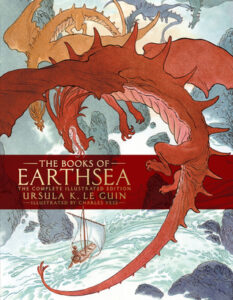 A Wizard of Earthsea, Ursula Le Guin
A Wizard of Earthsea, Ursula Le Guin
I’ve read this I don’t know how many times, and it always charms. This time, I read it in the edition illustrated by Charles Vess, which is just gorgeous — and includes both an introduction by Le Guin and an afterword, which shed a little light on the book and what she thought of it, where it came from, and where it went. If you’ve never read it, A Wizard of Earthsea is a hero’s journey, a fantasy tale with dragons and sea-voyages and magic, but also an inward one.
I still maintain that Ged’s journey makes an excellent metaphor for (how I experience) mental illness. Sometimes the descriptions of the Shadow and the way it haunts Ged are just far too familiar; they fill me with my own anxious dread. But then it’s good to be reminded that when you turn and face it, and hunt it down, and accept it as a part of you… to some degree, things can be overcome.
All that said, I still appreciate that Le Guin came back to Earthsea, and found herself looking at how it came to be such a man’s world, and how it could be fixed, things which her introduction discusses a little.
On a non-story note, I did notice some changes in the illustrated edition. Some were obviously good corrections (my old Penguin had plain-sailing as a “sacred” skill on Roke, while this version has it as “scanted”, which is much more likely)… and others I have arguments with, like changing “in wizardly fashion” to “in wizardry fashion”. I think it was right the first time! And my other comment is that I wish there was an illustration of the otak. My visual imagination is non-existent, though I’ve muzzily over the years somehow come to the conclusion that it’s basically a carnivorous guinea pig.
Rating: 5/5
Tags: book reviews, books, SF/F, Ursula Le Guin
Posted January 17, 2021 by Nicky in Reviews / 0 Comments
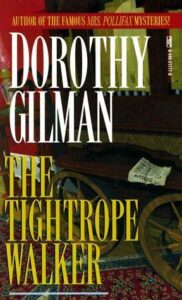 The Tightrope Walker, Dorothy Gilman
The Tightrope Walker, Dorothy Gilman
I got this because a) someone in the Legendary Book Club of Habitica guild on Habitica named it as one of their favourite books for a group readalong, and b) I’ve been meaning to try Dorothy Gilman’s books for a while (albeit I usually get recommended the Mrs Pollifax books). At the beginning, Amelia finds a note hidden in a hurdy-gurdy in the antique shop she’s recently purchased.
Amelia’s had a life half-sheltered by adults (her father, and then a psychiatrist her father paid to help her) and half-wrenched awry by the suicide of her mother when she was a child; she’s very naive at times, and yet surprisingly strong and driven once she finds something to care about… and she quickly comes to care about the contents of that note, which allege that the writer was held captive and forced to sign some kind of document she didn’t want to sign, and that she knows she will soon be killed. Amelia wants to find her, wants to know what happened, and she sets about doing just that.
I found myself caring a lot about Amelia and her quest; it all fell together almost too neatly, the coincidences all lining up to provide clues and to hook Amelia closer into her little quest… but something about her frank tone and determination won me over. Joe’s less knowable, given the narration, but the way he decides to help her with her little quest makes his character work for me as well. The relationship between them is a little quick, but it’s kind of like in Mary Stewart’s novels — in the context, I don’t really question it.
Pretty enjoyable, anyway! And I will have to read more of Dorothy Gilman’s work.
Rating: 3/5
Tags: book reviews, books, crime, Dorothy Gilman, mystery
Posted January 16, 2021 by Nicky in Reviews / 0 Comments
 Fence, vol 1, C.S. Pacat, Johanna the Mad
Fence, vol 1, C.S. Pacat, Johanna the Mad
I don’t know anything about fencing, so I can’t really comment on how well this portrays fencing, and indeed, that’s kind of not what I was interested in. It kept popping up when people were talking about Heartstopper, though, which I really enjoy, so I thought I’d give it a chance. It follows two fencers: Nicholas Cox and Seiji Katayama, plus other fencers at the school they both attend. They are, of course, bitter rivals — each with their own reasons for needing to become better fencers and beat those at another school, Exton. We don’t see much of Seiji’s motivations so far, but I’m sure we will.
The art is clear and easy to follow, and I like the character designs. The story hasn’t really got very far at this point, but I’m definitely ready to keep following it up — Nicholas’ motivations aren’t super unique or anything, but it could be a fun trope-filled ride, and I’m here for it. It feels like a shounen manga with queer characters, and I’m happy with that. Let’s see where the next volumes go!
Rating: 4/5
Tags: book reviews, books, C.S. Pacat, comics, Johanna the Mad
Posted January 16, 2021 by Nicky in Reviews / 2 Comments
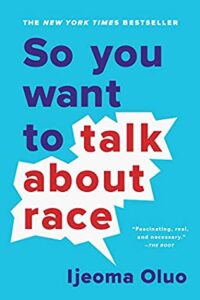 So You Want to Talk About Race, Ijeoma Oluo
So You Want to Talk About Race, Ijeoma Oluo
This is a short primer to various concepts that inevitably come up when you want to sit down and talk about race: how race affects people, your relationship to it, privilege, cross-sectionality, microaggressions… If you’ve been wondering what some of those concepts or buzzwords mean and you need a little more detail, this book has your back. It’s very readable, and well-organised into chapters that develop and build up an overall understanding of some of the major issues you’re likely to encounter.
I fear that if you’re not willing to go into it with an open mind, you won’t get anything out of it. The author asks the reader to sit with some pretty uncomfortable concepts, and goes to some pains to try and make that palatable, to try and convince the reader to open up to it. She’s very aware that people find it difficult to let go of their own preconceptions and their own view of themselves and dig into whether they might be contributing to racism in some way (or benefitting from it, or all unwittingly helping it along)… so if you’re already affected by racial issues, you might find that aspect a bit frustrating. She does mention it being for everybody, but it’s pitched at people who are largely unaffected by race.
I found it useful, though sometimes not very in-depth. Certainly a starting point, though.
Rating: 4/5
Tags: book reviews, books, Ijeoma Oluo, non-fiction
Posted January 16, 2021 by Nicky in Reviews / 0 Comments
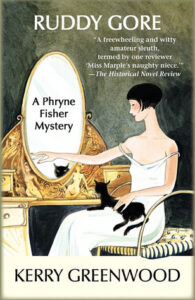 Ruddy Gore, Kerry Greenwood
Ruddy Gore, Kerry Greenwood
Blood and Circuses didn’t quite satisfy the hunger for rereading Phryne’s adventures, since it’s atypical in some ways. I joked on Litsy that I was rereading the series for the delicious dresses and beautiful food (with the adjectives that way round!) — and there’s certainly a good helping of that here, along with the first appearance of Phryne’s Chinese lover, Lin Chung. I can’t speak for how accurate or respectful his portrayal is; Greenwood is certainly sympathetic to the Chinese people living in Melbourne at the time, but there’s a fair amount of exoticisation going on there (as there is with Phryne herself, of course, but still).
Never having really known a serious actor personally, I find the way Greenwood portrays them bewilderingly malicious at times. I mean, Sir Bernard isn’t so bad, and Mollie Webb, but there’s so much spite, vanity and callousness flying around… particularly in the person of the beautiful Leila Esperance.
In any case, it’s a pretty fun one, and especially entertaining to see Greenwood portray a Welshman (even one who’s such a cad).
Rating: 4/5
Tags: book reviews, books, crime, Kerry Greenwood, mystery
Posted January 15, 2021 by Nicky in Reviews / 0 Comments
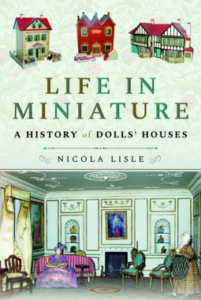 Life in Miniature, Nicola Lisle
Life in Miniature, Nicola Lisle
Received to review; published November 23rd 2020
Life in Miniature is a bit of a survey of dolls’ houses, mostly a descriptive one, which talks about some key examples in order to illustrate trends over the years, and ends with a chapter of advice for those interested in collecting dolls’ houses themselves. I’m not; I was more interested in this as a microhistory, and it does do a little of that, discussing the things dolls’ houses stood for, for those who owned them, and how trends developed.
For me, though, it was a bit too much plain description, too many descriptions of particular houses rather than the higher-level trends. Maybe there isn’t more to analyse about dolls’ houses, or the style is different to other microhistories I have loved… but it just didn’t turn out the way I hoped.
That said, if you’re a big fan of dolls’ houses and you’d like to know more about what’s out there, this book would be a great guide.
Rating: 3/5
Tags: book reviews, books, history, Nicola Lisle, non-fiction
Posted January 15, 2021 by Nicky in Reviews / 0 Comments
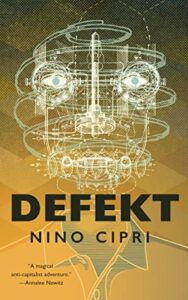 Defekt, Nino Cipri
Defekt, Nino Cipri
Received to review via Netgalley; publication date 20th April 2021
I didn’t love Finna, though I liked it; it felt it leaned a bit too much on being angry about soul-sucking capitalism (which, same, but the choir can get tired of being preached to). Defekt is set in the same world, and briefly crosses over with Finna (we see Jules right before the events of that book), but for whatever reason it worked a bit better for me — it felt a little less preachy, and I loved the idea of all those sentient furnishings. The toilet is a highlight (seriously).
I was a little bit put off by the “self-cest” thing, though: Derek is the main character, and after he takes an uncharacteristic sick day, he has to do a special inventory shift. During the shift, he meets four of his clones, and finds himself particularly drawn to one of them. Sure, that one is quite different to him in many ways, but the potential romance between them was a bit of an odd note for me.
Still, a fun novella, and I suspect those who already enjoyed Finna will enjoy this at least as much.
Rating: 4/5
Tags: book reviews, books, Nino Cipri, queer fic, SF/F
Posted January 13, 2021 by Nicky in Reviews / 0 Comments
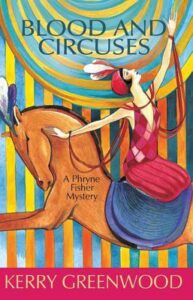 Blood and Circuses, Kerry Greenwood
Blood and Circuses, Kerry Greenwood
Blood and Circuses is, of course, a reread for me — the book in which Phryne Fisher joins the circus to work out a mystery, at the pleading (and goading) of her carnie friends… while at the same time, a horrible murder has taken place which Jack Robinson must investigate. It’s always interesting to see Phryne out of her element, because that’s when she has to be her most resourceful, and the circus is a whole new world for her.
There’s also Lizard Elsie, and her adventures with Miss Parkes and Constable Harris, which keep things entertaining (to say the least).
It always feels like it takes a while to heat up, and then suddenly flies by once Phryne’s there in the circus. It’s surprising to realise how fast it goes. I always enjoy this one, and I’m particularly entertained (as ever!) by the scene in which the clown and the carnie have to cuddle Phryne to help her get over her shock…
Rating: 4/5
Tags: book reviews, books, crime, Kerry Greenwood, mystery
Posted January 13, 2021 by Nicky in Reviews / 2 Comments
 The Citadel of Weeping Pearls, Aliette de Bodard
The Citadel of Weeping Pearls, Aliette de Bodard
I really need to read more of the Xuya stories and novellas all at once, because I like the world but it always takes me some adjustment time. The Citadel of Weeping Pearls stands alone, though, and once you get your head around the fact that it’s based on Vietnamese culture and customs (but in a space empire), it flows along smoothly. Bright Princess Ngoc Minh has been missing for years, along with her Citadel, after her mother the Empress sent armies against her. Grand Master Bach Cuc has been searching for her, and seemed to be close to a breakthrough, but now she’s missing — and Diem Huong, a commoner who lost her mother on the Citadel, is also about to conduct an experiment that may send her to the Citadel.
I found that the only thing that bothered me was the number of POVs, and that was mostly while I was settling into the story. It was obvious why we needed the various POVs by the end; without them, the Empress seems just horrible (instead of a woman who makes horrible decisions believing they are for everyone’s good, which is a different sort of horrible), Ngoc Ha seems too wishy-washy… but together they all work out and show a sad story, examining the bonds between families, and the terrible things an Empress might do for the good of everyone (or not).
It works really well as a novella; I think it’s perfect at this length.
Rating: 4/5
Tags: Aliette de Bodard, book reviews, books, mystery, SF/F
Posted January 12, 2021 by Nicky in Reviews / 0 Comments
 The Bookseller’s Tale, Martin Latham
The Bookseller’s Tale, Martin Latham
I feel like this book wasn’t quite sure what it was. History of the book? History of access to books? History of what people think about books? Autobiography of Martin Latham? There’s some genuinely interesting stuff sandwiched in between Latham making sure we know that he worked for Tim Waterstone and knew a bunch of famous people before you could Google them. Sometimes his anecdotes work to illustrate the narrative he’s trying to spin… and sometimes he’s telling us about weird dreams he had.
It was also full of this… reverence for the codex (not the contents) as a physical object, and being passionately in love with the physical form of a book. He’s a fan of physical books you can fondle, annotate, spill things on, write your name in… And I can get it, to some extent, but you’d think people aren’t real readers if they don’t like to caress books or crease spines or whatever. He does bring across the sensual enjoyment of books, and what a delight that can be for some people, but, yeah, just not sure about this absolute lionising of the codex-form of books above all else, above even the contents (which he rarely discusses in detail).
I expected to love this, but found myself fairly nonplussed. Overall, I can’t say I really enjoyed it — something about Latham and me just didn’t click, for a start.
Rating: 2/5
Tags: book reviews, books, history, Martin Latham, non-fiction
 A Wizard of Earthsea, Ursula Le Guin
A Wizard of Earthsea, Ursula Le Guin








